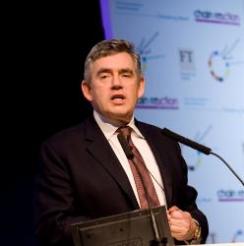Gordon Brown used his first major public speech as Prime Minister today to commit £515m to a raft of measures designed to boost the third sector’s partnership with government and its ability to build a stronger civic society.
The PM committed funds totalling £515m over the next three years to a range of initiatives, voiced his support for the sector’s campaigning and community action role, and announced the creation of an annual global forum on social leadership.
The plans are part of the long-awaited Cabinet Office/Treasury review of the role of the third sector in social and economic regeneration, which sets out the government’s plans for working with the sector over the next ten years and followed its biggest ever consultation with the sector.
Included in the new pledges were:
• £117m for youth volunteering, building on the work of youth volunteering charity v, to create a national youth community service for Britain
• £88.5m for infrastructure support for frontline groups, delivered through Capacitybuilders
• A new £50m match fund to help local community foundations develop endowments to secure their grant-making, on top of the £80m small grants programme announced in the Budget
• A further £10m for community anchor organsiations and development of community assets, on top of the £30m Community Assets Fund already announced
• The creation of a new Council on Social Action led by Community Links chief executive David Robinson to advise the government on new initatives to celebrate and inspire community activists
• The launch of a Prime Ministerial Award for Social Technology to support the use of widely-owned technology for social ends
• Reform of the honours system to ensure that the “significant majority” of honours are awarded to “unsung heroes” who serve their community. The public will be invited to submit nominations
• £5m for a national third sector research centre
In his speech, Brown said the government would work with the Charity Commission and others to explore ways of enabling voluntary organisations to campaign without compromising their charitable status. And he said the government would examine how a new social investment bank might help charities that find it hard to access mainstream finance.
Three-year contracts would be encouraged “where possible” and there would be continued focus on the Compact.
Brown said the new annual global forum on social leadership will meet each year to “inspire debate, forge links between community activists and stimulate the pursuit of social change, showing to the world that not only is the UK at the forefront of thinking and development in social leadership, but that we are prepared to spend our funds to bring together people from all over the world so that they can exchange ideas”.
Acevo chief executive Stephen Bubb praised the review: “Overall, it’s bloody good. There’s more in it than we expected. Brown has been seen as just about volunteering but with this he has shown he sees the power and potential of the sector to deliver social change.
“It’s significantly more impressive than the launch of the Tories’ social justice stuff.”
Bassac chief executive Ben Hughes added he was particularly pleased to note the emphasis on supporting voice and campaigning.
Brown chose 24 July for the speech to represent the commitment that ordinary people across the UK make to “act for social change, 24 hours a day, seven days a week”. He also used the occasion to launch his new book, Britain’s Everyday Heroes, about 33 people who had inspired him during his travels around the UK. The book will sell for £10.99 with all royalties going to Community Links.









